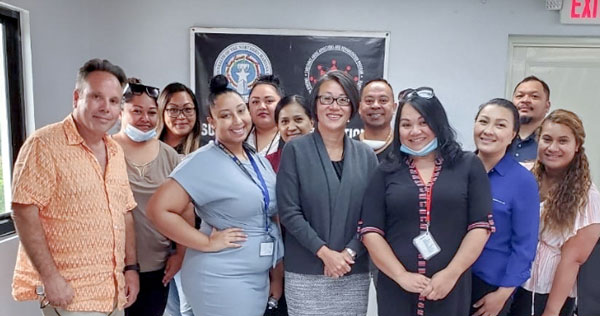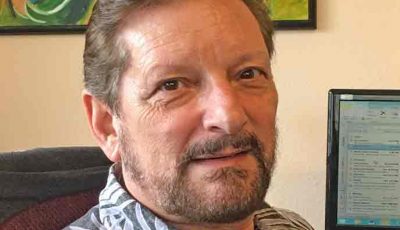HOPE launches framework for problem gambling services

Substance Abuse, Addiction, and Rehabilitation Program special assistant Yvette R. Sablan, staff of the HOPE Recovery Center, Associate Judge Teresa Kim-Tenorio, officials of the CNMI Drug Court Division, the CNMI Board of Parole, the Office of Adult Probation, the Division of Youth Services, the Community Guidance Center, the Office of the Public Defender, and the CNMI Superior Court meet with Problem Gambling apecialist Roger Humble to discuss problem gambling in the CNMI, which is a diagnosable and treatable disease. (CONTRIBUTED PHOTO)
The Hinemlo O’hala Para Enteramenti, HOPE Recovery Center under the Substance Abuse, Addiction, and Rehabilitation program, under the Office of the Governor, continues to take steps to initiate their services on problem gambling, which they have been working on since 2018.
Two of its clinical staff have completed their problem gambling certification studies and are ready to start their clinical hours toward their certification.
As the month is recognized for problem gambling awareness to both raise public awareness and help individuals and families that are struggling with gambling addiction, it must be emphasized that although problem gambling is widely known as the “hidden addiction,” it is a diagnosable and treatable disease.
“After four years of waiting out and working through our challenges with Super Typhoon Yutu and the COVID-19 quarantine and directives, we were finally able to get Mr. Roger Humble, CSAC, CGAC, to come out to the CNMI and help the HOPE Recovery Center to build and launch its structure and framework for Problem Gambling services,” said special assistant Yvette R. Sablan. “After his first week, we have incorporated a gambling screening tool within our biopsychosocial assessment and are prepared to offer an educational course to our HOPE residents. Additionally, we had our first stakeholders meeting to seek partnership and collaboration on this mission. We hope to get everyone on board to start screening for problem gambling within their respective services and eventually work on building professional capacity toward providing educational courses within their agency and onward to the community.
“There is still much work ahead to better understand and be able to recognize gambling addiction, but we will be working through the consultation of Mr. Humble, and we anticipate to have data and be ready for next year’s Problem Gambling Awareness month. By then, we also hope to have sponsors for public awareness events and activities,” added Sablan.
Dorene Kintol, clinical manager at the HOPE Recovery Center, said, “Gambling addiction disorder is taboo in our community. No one admittedly talks about their personal or familial struggles with playing cards, playing poker, or sports betting because 1) it’s their money and 2) if it’s not affecting you, mind your business. However, as the addiction progresses, it consequently impacts them personally, interpersonally, and socially. The HOPE Recovery Center is working toward implementing prevention and clinical intervention services to address the hidden addictive disorder.”
“It has been a great honor to be in the CNMI during Problem Gambling Awareness Month to help assess the impact and need for gambling services on the island. I’m very confident that the staff at the HOPE program have the will and the expertise to start gambling services for those that have been affected by problem gambling and to help end the suffering caused by gambling disorders,” said Humble. (PR)


























